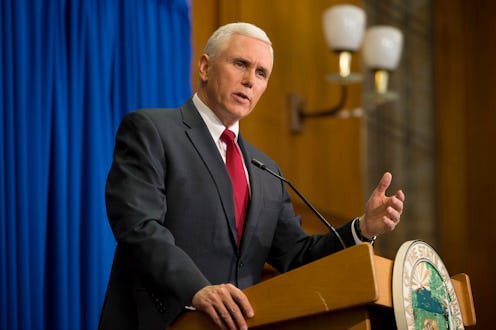News
Boycotting Indiana Could End Up Harming LGBTs
When Gov. Mike Pence signed the Religious Freedom Restoration Act into law last week, little did he know that Indiana would be the target of a statewide boycott, with celebrities, businesses, as well as city and state governments uniting in opposition to punish Indiana through its economy. For those outside looking in, the opposition might seem heartening as it indicates the disapproval of such discriminatory bills, but boycotting Indiana might most affect the LGBT community within the state, who have no doubt fought long and hard against Pence and his conservative goons.
Surprised by the nation's outrage at the legislation that essentially would allow businesses in the state to refuse service to gay people on the grounds of exercising their "religious freedom," on Tuesday, Pence held a press conference conceding that the RFRA faced some "perception" problems that he vowed to fix by inserting an anti-discriminatory clause.
While this most certainly is a result of the calls for boycotting the state — that already cost Indiana at least $40 million when Angie's List canceled its expansion plans in protest of RFRA — the boycott has its opponents too, among them resident and activist Melissa McEwan, who took to Twitter to push back against calls for the boycott.
While the anger directed at Pence and supporters of the RFRA is well deserved and understandable, many have also deigned to lobby criticism at Indiana and its residents as a singular entity. Such criticism not only sets back efforts within the state that oppose the law, it also perpetuates the assumption that the entire state of Indiana is comprised of bigots or the ignorant — an assumption that is most detrimental to the very group that the law itself allows to discriminate.
In an impassioned post about her opposition to the boycott, McEwan called out those crying for a boycott of the entire Indiana state, making sure to point out the ignorance of those directing vitriol on residents of the state under the guise of unsolicited advice:
Suffice it to say that I — and many of my queer/progressive Hoosier compatriots — have not exactly been convinced of the professed enlightenment of people who talk about how our entire state should be abandoned, blown up, and written off as worthless. ...
Who are talking to us like we don't know our own state, like none of us have lived anywhere else or traveled anywhere else (including some of these progressive cites which are much more segregated than lots of communities in Indiana).
Instead of abandoning Indiana, McEwan pointed to the more effective method to combat bigotry from within, by offering the state's progressives "sustained attention" and support. She also offered a handy link to a list of Indiana organizations that advocate and provide for progressive political and social assistance to the LGBT community in the state. McEwan wrote:
Look, I understand the kneejerk reactionary support of a boycott. Once upon a time, I supported sanctions and boycotts, too, and then I listened to people who lived under sanctions and boycotts, and I radically and fundamentally changed my position. They harm the people who are already most vulnerable.
There is no quick or easy fix in Indiana. Consequences come at the polls. That only happens with long-term progressive strategy, which I understand demoralizes people. (None more so than progressive Hoosiers.) We desperately need sustained attention, not sloganeering.
While many did urge opposition to the RFRA before Pence put his signature on it, the national outrage only truly began after the bill became law. Perhaps calls for action on such legislations could serve better if they came before passage through governmental bodies, not after the fact, when it becomes substantially more difficult to combat.
Image: Getty Images (1)
